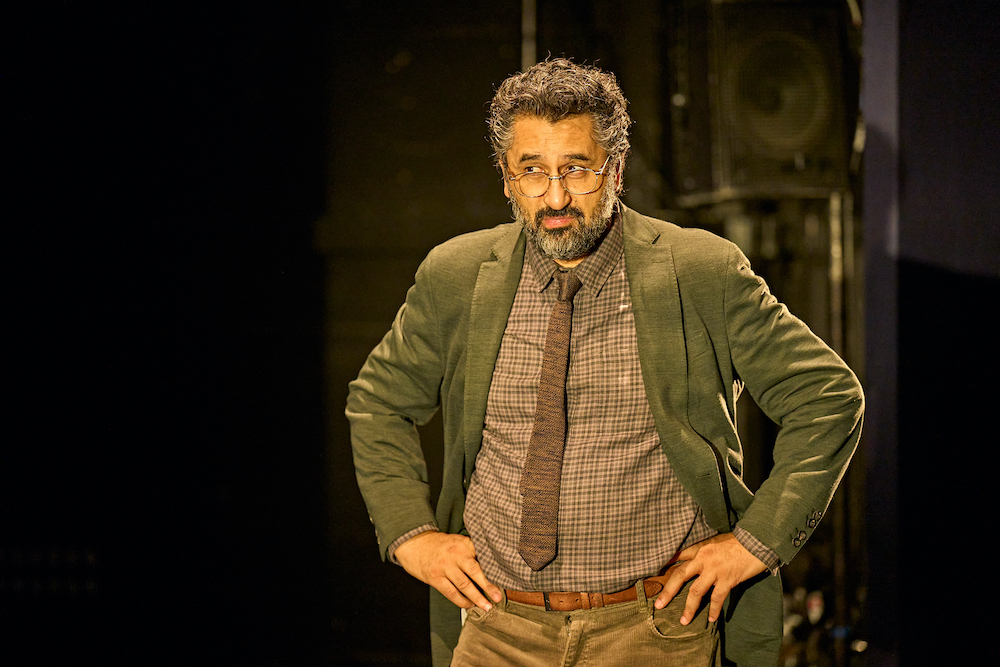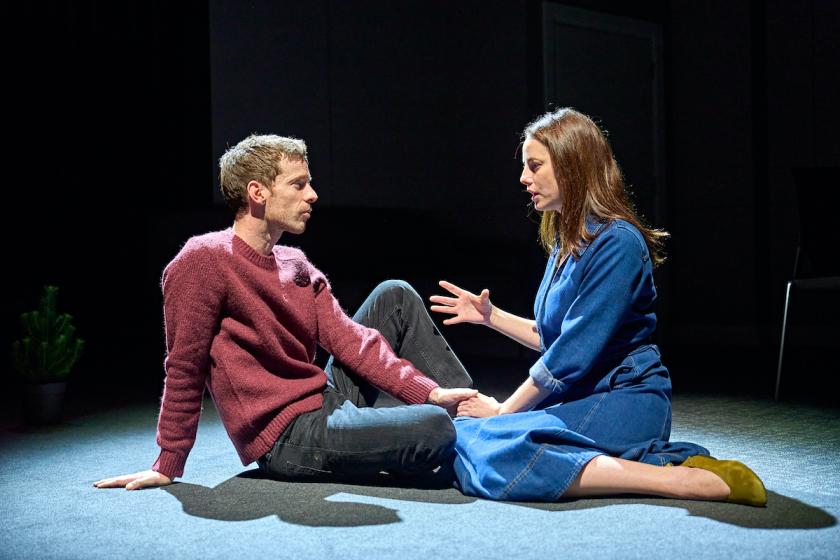Our humanity is defined not only by our use of language, but also by our sense of the spiritual. Whether you are a believer or not, it’s hard to deny the attractions of religion for billions around the world. Sounds portentous? Yeah. Okay, you’re now in the zone for Beau Willimon’s new play East Is South, currently at the Hampstead Theatre, a work which suggests that the digital world can also be mystical place.
In our ChatGPT universe, the playwright, who created House of Cards for Netflix and inspired the George Clooney political thriller The Ides of March, explores contemporary ideas about Artificial Intelligence and its relationship with religious feeling. But, although billed as a thriller, his drama fails to fulfill its promise.
Set in the offices of Logos, a US high-security research facility “30 floors under the desert”, the plot shows what happens when two young coders, Lena and Sasha, are caught trying to over-ride the secure failsafe which protects the super AI programme. Because they are working for the National Security Agency, this is not just a breach – it’s treason. So the building goes into lockdown and Lena and Sasha are flung into solitary confinement, denied access to food and the toilet, and subject to questioning: what were they doing? Who do they work for? And why? Leading the investigation is Agent Samira Darvish, her colleague Ari Abrams, and their boss Olsen. They suspect that Sasha, who has a past as a Russian dissident, is a spy, and that Lena, once a Mennonite, is his accomplice. They are particularly intrigued by a phone message sent between them: “East is South”. Is this a code, and what does it mean? Very soon it emerges that the youngsters believe that the Logos system is not only a creative AI tool, but has the capacity to become a godlike, benign, force – which might even be able to save humanity from itself. It’s a nice reversal of our current fears about AI becoming a monstrous world dictator.
Leading the investigation is Agent Samira Darvish, her colleague Ari Abrams, and their boss Olsen. They suspect that Sasha, who has a past as a Russian dissident, is a spy, and that Lena, once a Mennonite, is his accomplice. They are particularly intrigued by a phone message sent between them: “East is South”. Is this a code, and what does it mean? Very soon it emerges that the youngsters believe that the Logos system is not only a creative AI tool, but has the capacity to become a godlike, benign, force – which might even be able to save humanity from itself. It’s a nice reversal of our current fears about AI becoming a monstrous world dictator.
The problem is that Willimon breathlessly introduces too many intriguing ideas, while never pausing long enough to explain them. The result is a confusing feeling of watching through a glass darkly, as highly vivid characters discuss issues that are forever slipping out of focus. There are fascinating comments about the digital world, about AI and its potential, about spiritual feeling and religious belief. If God is ineffable, innately mysterious, does the same apply to computer programmes that no one is able to control? Great question, but it’s a shame that the playwright doesn’t give himself enough space to provide an answer.
For a start, it is not clear to me what the Logos programme is for, and how Lena and Sasha expect it to become the saviour of the world. Without that, the thrills of this thriller are markedly less thrilling. It doesn’t help the story’s clarity to have a range of characters that seem deliberately eccentric to the point of comedy: Darvish is a Sufi Muslim, Abrams a Maori Jew, or Jewish Maori, Lena a former Mennonite and Sasha a former classical pianist, and atheist. All seem to suffer a sense of loss, of belief, of heritage, of skills. Only Agent Olsen, who proudly, and satirically, calls himself simply an American, has the confidence to ignore profound questions – and administer violence.
So the action of the plot, which never takes off and whose ending is sadly predictable, gets bogged down in interesting, if rather irrelevant, philosophical dialogues. The best explore the idea that AI cannot understand contradictions, statements such as “East is South”, because they are incorrect and therefore can’t compute, while religions often are centred on paradox and mystery. But when Abrams, who is a former academic, expounds post-structuralist theory, I found myself wishing for a Tom Stoppard, who is equally difficult but twice as relevant. There are great moments when the cast sing a hymn, or Sasha extols the beauty of Bach’s Toccata and Fugue in D Minor, but they are not enough.
Ellen McDougall’s production, on Alex Eales’s split-level set design, adds to the text’s lack of clarity, with some of dialogues being hard to hear, and actors moving across the set randomly. In the progamme, Willimon candidly admits that he didn’t map out the plot of the play in advance, and I must say that it shows. Instead, there are clever flashbacks and much material about the big questions of parental control, religious sects, complicated cultural heritage, memories and lies. The occasional good joke and the general sense that paranoia drives the American security services don’t add up to more than a smile. But what about the cast?
Skins star Kaya Scodelario, making her stage debut, does a good job in creating the ambiguous Lena (trauma victim or liar?) while Luke Treadaway’s Sasha is passionately intense. But it beggars belief that either character would be recruited by the NSA. On the other side, Nathalie Armin is a coolly persistent Darvish and Alec Newman gives Olsen an iron edge. Cliff Curtis’s intellectual Abrams (pictured above) gives a strong insight into Maori traditions, but seems out of place in a high-security environment, belonging more to a boozy bohemian party. Aaron Gill can’t do anything with the role of Technician, which has no purpose. Which kinda sums up this play. Fans of Willimon should stay in and watch House of Cards and The Ides of March instead.















Add comment